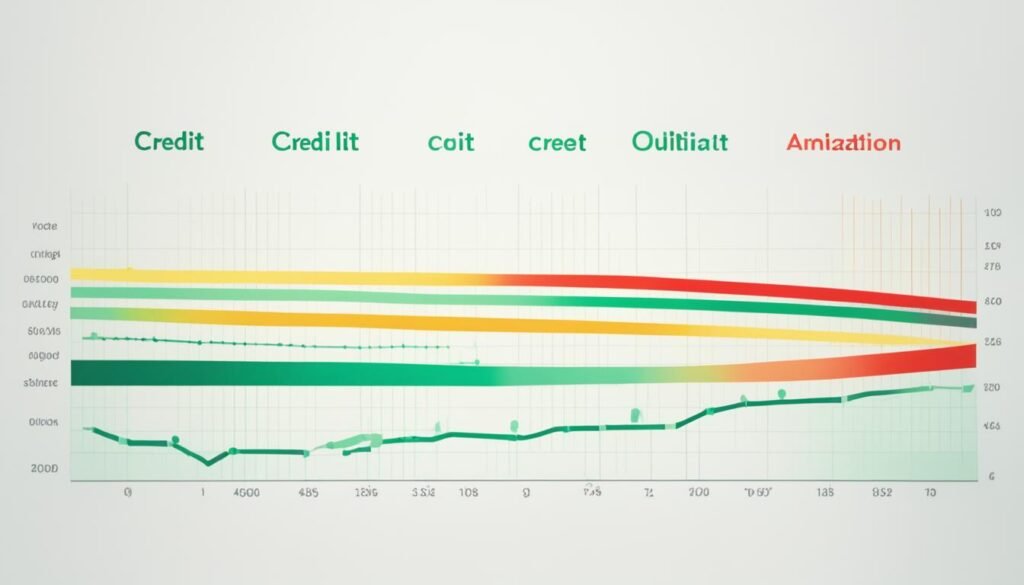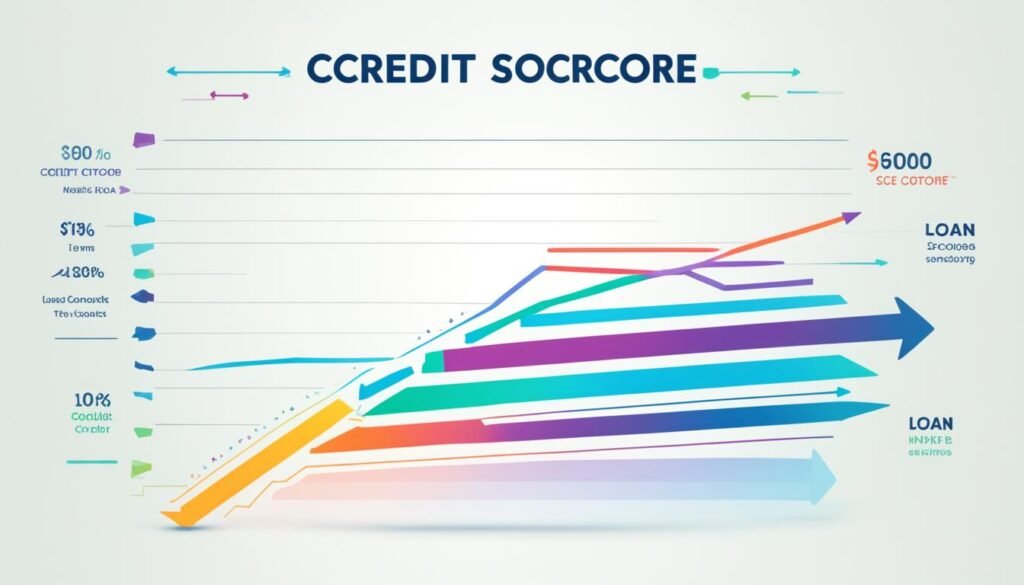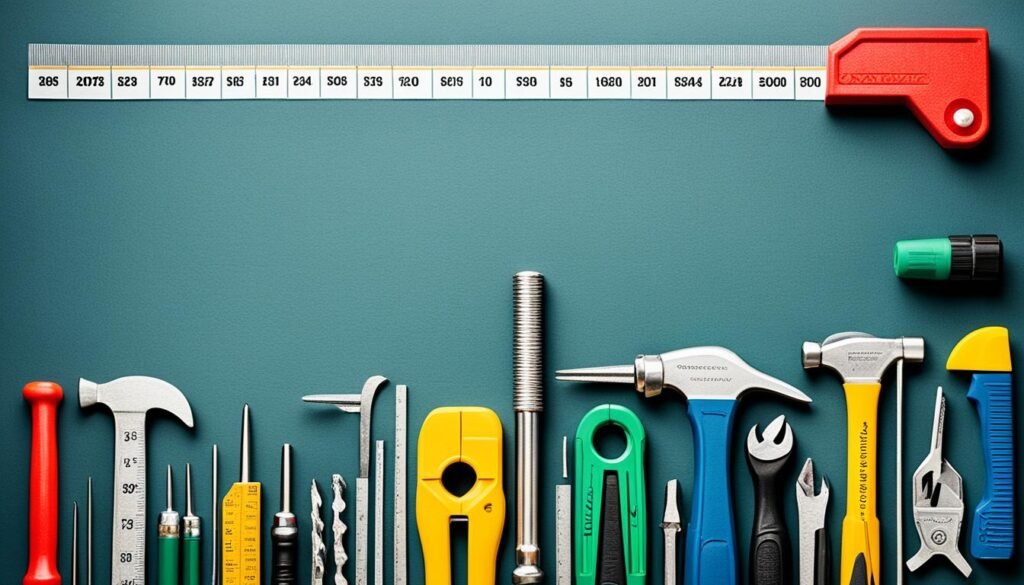Having a strong credit score is key to getting good loan terms and interest rates. It makes buying big items easier. This guide will show you how to raise your credit score. Then, you can get better loan choices.
Key Takeaways
- Understand the importance of a good credit score for accessing better loan options
- Learn how to manage your credit utilization ratio to improve your credit score
- Discover the benefits of making timely payments and diversifying your credit mix
- Explore the role of credit report monitoring and becoming an authorized user
- Utilize credit-building tools and seek professional assistance when needed
The Importance of a Good Credit Score
A strong credit score is vital for getting good loan deals and interest rates. It shows lenders you’re reliable. This makes it easier to get loans with better terms and low interest.
A high credit score opens many financing doors. It paves the way for buying a new home or car, or starting a business. But, a low score limits you to high interest loans and makes loan approval tricky.
People with top credit scores can save a lot on interest over the loan’s life. This saving shows how crucial a good credit score is for getting favorable loan terms and rates.
“A good credit score is the key to unlocking better financial opportunities and achieving your long-term goals.”
Keeping a high credit score matters for more than loan approvals. It boosts your financial health overall. A good credit history helps with everything, from renting to getting a credit card easily.
Learning how to improve your credit score is worth it. Focus on a good credit score to get better loan options and lower interest rates. It can help you reach your financial dreams more easily.
Also Read :What Is Professional Liability Insurance?
Understanding Credit Utilization Ratio

Your credit utilization ratio is key to your credit score. It compares your used credit to your total credit. Try to keep this ratio under 30% to improve your score.
Credit use makes up 30% of your FICO score. This means it’s a big deal for lenders. They see low use as you being good with debt and trustworthy.
How to Calculate and Manage Your Credit Utilization Ratio
Calculating your credit use ratio is simple. Just divide what you owe by what you could borrow. For instance, with a $10,000 limit and $3,000 used: $3,000 / $10,000 = 0.30 or 30%.
- Check your credit use often and aim for under 30%.
- Lowering what you owe helps decrease your credit use.
- Ask for more credit to raise your total available credit.
- Don’t use up all your credit, this can harm your score badly.
Understanding and managing your credit use can boost your credit score. It also opens doors to better loan deals and interest rates.
“Keeping your credit use low is a top way to lift your score and better your financial health.”
| Credit Utilization Ratio | Impact on Credit Score |
|---|---|
| Below 30% | Positive impact on credit score |
| Above 30% | Negative impact on credit score |
| Above 50% | Significant negative impact on credit score |
Making Timely Payments

It’s vital to pay your bills on time to boost your credit score. Your history of payments makes up 35% of your FICO score. This is key for showing you’re creditworthy.
By always paying on time, you prove you’re reliable. This helps you get better loans and lower interest rates. But, missing payments hurts your score, making it hard to get big loans later.
Ways to keep your payments good include:
- Use auto payments or set reminders to avoid missing deadlines.
- If you know you’ll be late, talk to your lender fast to sort out new terms or plans.
- Check your credit reports often to fix any mistakes that could hurt your score.
| Payment Behavior | Impact on Credit Score |
|---|---|
| Consistent on-time payments | Positive impact on credit score |
| Late or missed payments | Negative impact on credit score |
Choose to pay on time to better your credit score. This opens doors to more loan choices and lower rates.
“Paying your bills on time is one of the most effective ways to build and maintain a strong credit score.”
Also Read :Top Tips For Getting Your Loan Approved
Diversifying Your Credit Mix

Improving your credit score? Having many types of credit helps a lot. Lenders look at your credit mix, like credit cards and loans, when considering your FICO score. This part makes up 10% of your score. Showing you can handle various credits makes you more trustworthy to lenders.
A mix of different credits is beneficial. It proves you can manage various accounts well. Also, it can offset any bad effects from just one account, like a large credit card balance or a new loan.
Achieving a Balanced Credit Mix
To have a balanced credit mix, you should do a few things:
- Have both credit cards and loans.
- Get different types of credits, like a credit card and a personal loan.
- Keep old accounts open, as they show a longer credit history.
- Don’t close unused credit cards to keep your credit report healthy.
The goal is to show you can manage different types of credit well. Be smart in managing your credit. Don’t just get many accounts. Focus on wisely managing the ones you have.
| Credit Type | Impact on Credit Score |
|---|---|
| Credit Cards | Can affect credit utilization ratio |
| Installment Loans | Shows you can responsibly handle different types of credit |
| Retail Store Cards | Can make your credit mix more varied. But, they often have higher rates and lower limits |
| Mortgage Loans | A long-term loan that can positively affect your credit history and mix |
Building a diverse credit mix smartly can open better loan options to you. You might get lower interest rates. This can help you reach your financial dreams.
“A diverse credit mix is a key component of a healthy credit profile. It demonstrates your ability to responsibly manage different types of credit, which can be a significant factor in lenders’ decisions.”
Also Read :Why Do I Need Health Insurances?
Loan Options

The loans you choose can greatly affect your credit score. Different loans can help with your credit mix, payment history, and how much credit you use. These three things are very important and make up almost half of your FICO score.
Getting a personal loan is a good step. By paying it back on time, you show you’re good with different types of credit. This can make your credit mix look better. And, making on-time payments boosts your payment history, which lifts your credit score.
A debt consolidation loan is another smart choice. It lets you merge many debts into one, easier to handle payment. This can lower your credit utilization, which is great for your score.
Want to build or fix your credit? Consider a credit-builder loan. They’re for folks with little or poor credit history. You make payments that help show you’re reliable to the credit bureaus.
| Loan Type | How it Impacts Credit Score |
|---|---|
| Personal Loan | Contributes to credit mix and payment history |
| Debt Consolidation Loan | Reduces credit utilization ratio |
| Credit-Builder Loan | Helps establish or rebuild credit history |
Choosing the right loan is key to improving your credit. It can help you get better loan terms and rates down the road.
Also Read :Best PHD Scholarships In USA For International students
Monitoring Your Credit Reports

It’s vital to check your Loan credit reports often. They hold key details about your financial past. This includes how you’ve paid your bills, used your credit, and any debts you owe. By watching reports from Experian, Equifax, and TransUnion closely, you can find and fix mistakes that might lower your credit score.
Missteps on your credit report, like wrong late payment marks or someone else’s debt mixed in yours, can hurt your credit. Looking over your reports and fixing errors can boost your score. It also makes sure your financial record shows your real credit standing.
The Importance of Regular Credit Report Monitoring
Experts think it’s wise to check each of your big three credit reports once a year, or more if you think something’s off. Keeping an eye on your reports can help you spot and deal with errors fast. This stops them from dragging your score down.
- Identify and dispute any errors or inaccuracies in your credit reports
- Ensure that your credit history is accurately reflected
- Catch signs of identity theft or fraudulent activity early
- Monitor for changes that could impact your credit score
Many people don’t realize how crucial keeping an eye on their credit reports is. But, by being proactive, you can learn a lot about your money health. Plus, it lets you work towards a better credit score. That means more loan choices and lower interest rates.
“Regularly checking your credit reports is one of the most effective ways to catch and dispute errors that could be hurting your credit score.”
Also Read :How Do I Find The Best Insurance Policy For Me?
Becoming an Authorized User

Adding yourself as an authorized user on someone’s credit card helps you build or boost your credit score. Do this especially if the card owner has good credit and doesn’t use much of their limit. You benefit by having their good history and high limits reported to the bureaus. This may improve your own credit.
There’s a lot to gain by becoming an authorized user. It lets you hitch a ride on the card owner’s smart credit moves, even if your credit isn’t written yet. This helps newbies or those who’ve had credit problems before.
- The account holder’s pay record shows up on your credit report. This might make your credit history look longer.
- The limit on the card you’re added to plays into your use of credit, possibly lowering it and raising your score.
- It adds to your credit’s variety, which also helps your score look good.
But, be warned: the effect on your credit score could go either way, depending on the owner’s credit habits. If they’re often late or max out their credit, you might not see the boost you hoped for.
“Joining a credit card with a long, positive story can really help your credit, especially if it has a high limit and low usage.”
For this to really work, pick an account owner who’s careful with credit and has a solid score. And, check regularly to ensure your status as an authorized user is helping your score as expected.
Avoiding Unnecessary Credit Inquiries

Maintaining a strong credit score means you should care about credit inquiries. When you ask for new credit, your lender checks your score. This creates a hard inquiry on your report. Too many of these can lower your score a bit. If you ask for credit a lot in a short time, this effect gets worse.
To keep your score up, choose wisely when getting new credit. Going for soft inquiries is smart because they do not harm your score.
Soft inquiries happen when you look at your own credit. They also happen when a lender pre-approves you. These are not bad for your score like hard inquiries are.
- Limit how many new credit applications you send to avoid lots of hard inquiries.
- Use tools that allow soft inquiries to see your options without hurting your score.
- Be careful with “pre-approved” credit offers. They might lead to a hard inquiry if you choose to apply.
- Check your credit reports often. This is to make sure any credit inquiries listed are correct and needed.
Keep an eye on the impact of hard versus soft inquiries. Focusing on soft ones helps you keep a good credit score. This way, you can get better deals on loans and interest rates.
“Limiting credit inquiries is a simple yet effective way to protect your credit score and keep it in the healthy range.”
Using Credit-Building Tools

Building or improving your credit can be tough, especially if you have little or poor credit history. Thankfully, there are credit-building tools that can help. Tools like Experian Boost let you add other types of payments, such as rent and utility bills, to your credit report. This can help boost your credit history and credit score.
If you find it hard to grow a strong credit history, these tools might be just what you need. Adding rent and utility payments to your credit report shows you handle money well. It could lead to a big jump in your credit score. As a result, you might get better loan offers and interest rates when buying big things.
Leveraging Alternative Credit Reporting
One big plus of using credit-building tools is they work with alternative credit reporting. Regular credit reports often miss some of your good financial habits. They don’t usually include payments not sent to the major credit bureaus. But, add your rent and utility payments with these services, and your financial care appears in a better light, possibly leading to a higher credit score.
| Feature | Experian Boost | Other Credit-Building Tools |
|---|---|---|
| Types of Payments Reported | Utility, telecom, and streaming service payments | Rent, utility, and other recurring bills |
| Impact on Credit Score | Potential for an immediate boost of up to 12 points | Varies, but can lead to significant credit score improvements |
| Ease of Use | Seamless integration with your Experian account | May require manual reporting or third-party service connections |
Exploring different credit-building tools can really shape your financial future. Experian Boost and other tools could change your credit for the better. They’re worth checking out in your journey to a stronger credit score.
Seeking Professional Assistance

Struggling to boost your credit score on your own? Consider getting expert help. Credit counseling services, credit repair companies, and financial advisors can guide and support you. They make the journey of building credit easier.
These professionals pinpoint the issues that are lowering your score. They craft a plan just for you. They help you take steps to reach your credit goals. This support can unlock secrets to a better credit score.
Credit counseling services will clarify your credit report. They will help you make a budget. They’ll also aid in creating a plan to tackle your debts. Credit repair services will look for and fight credit report errors. These errors might be hurting your score. Finally, financial advisors take a broad view. They help with overall financial health. Plus, they work on plans for long-term credit betterment.
It may cost you to work with professionals, but it’s often worth it. You could see your credit and loan options improve. This can lead to a more stable financial future with their help.
“Improving your credit score can open doors to better loan terms, lower interest rates, and greater financial opportunities. Working with a professional can be a game-changer in reaching your credit-building objectives.”
Remember, fixing your credit isn’t a fast process. But, with the right help, you can steadily move forward. This leads to the lasting benefits of a solid credit score.
Also Read : Where To Get Spot Loans For Emergency Funds?
Conclusion
By following the steps in this guide, you can improve your credit score and get better loan choices. This will help you financially. Learning about how you use credit and having different types of credit helps. Check your credit reports often and use tools that help build credit.
It takes time to make your credit profile strong. But the benefits in the future are big. Your main goals should be to improve your credit score, find the best loan options, and boost your financial health in the credit world.
If you work hard and plan well, you can guide your credit path to success. Use all the help you can get. This will increase your credit score and open new doors for your finances.
FAQs
How can a good credit score help me qualify for better loan options?
A good credit score opens doors to better loan terms and lower rates. This leads to easier financing for big buys or investments. It proves to lenders you’re reliable, offering more options and better financial chances.
What is credit utilization ratio and how does it impact my credit score?
It’s how much credit you use compared to what’s available. Keeping it under 30% helps your score. It’s a crucial part of your FICO score, influencing over 30% of it.
Why is making timely payments important for improving my credit score?
On-time payments are a must for boosting your credit. They make up 35% of your FICO score, the biggest piece. Punctual bill payments across credit cards, loans, and such can greatly lift your score over time.
How can diversifying my credit mix help boost my credit score?
Having different types of credit is beneficial. It includes managing credit cards, loans, and credit lines well. This shows you can handle various debt types responsibly, improving your credit standing with lenders.
What loan options can help me build or improve my credit score?
There are various loans that can boost your credit. Personal loans can help with payment history and mix of credit. For credit-building, consider debt consolidation or credit-builder loans. They cut your use of credit and build a positive payment record.
Why is it important to regularly check my credit reports?
Checking your credit reports often can catch and correct mistakes. Errors, like incorrect late payments or mix-ups with someone else’s credit, can damage your score. Solving these issues can make your credit score better.
How can becoming an authorized user on someone else’s credit card help my credit score?
Joining someone else’s credit card can raise your score. It works best with a user that manages their card well. You gain from their good payment history. This reflects positively on your credit report.
Why should I limit the number of credit applications and inquiries?
Too many credit checks hurt your score. Each application leads to a hard inquiry, lowering your score temporarily. A few inquiries are fine, but many quickly become a problem. Focus on quality credit applications and use soft inquiry prequalification checks to protect your score.
How can credit-building tools like Experian Boost help improve my credit history?
Experian Boost lets you add non-traditional payment types, like rent, to your credit report. This can help those with limited or poor credit to show they are responsible. It might improve your score by including additional payment data.
When should I consider seeking professional assistance to improve my credit score?
If improving on your own is tough, professional help could be beneficial. Credit counseling, repair services, or financial advisors can offer solutions. They pinpoint and fix negative credit factors while guiding you to meet your credit goals.
Source Links
- https://www.bankrate.com/loans/personal-loans/improve-credit-score-with-personal-loan/
- https://www.experian.com/blogs/ask-experian/credit-education/improving-credit/improve-credit-score/
- https://www.nerdwallet.com/article/finance/raise-credit-score-fast




